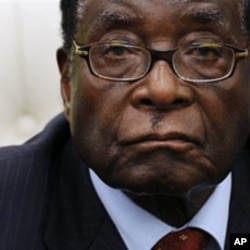Zimbabwe's Supreme Court heard a case on behalf of three farmers who claimed the constitution excluded confiscation of their land because they bought their properties after the colonial era ended with independence in 1980.
The Supreme Court did not agree and quickly dismissed their application.
One of the farmers, Colin Cloete, a former president of the Commercial Farmers’ Union at the height of often violent land invasions seven years ago, was one of the applicants.
He, like many of his colleagues, has been arrested, harassed and appeared in court many times, to try to stay on his farm.
Like most surviving white farmers, the cost of going to court to try to fight his eviction has been unaffordable.
Looking back over the long and difficult years, Cloete, now 58, said his struggle to remain on his farm did not make economic sense.
“Economically we should have moved off then, at the beginning, as we would have been 10 years younger and that much more energetic,” said Cloete.
Cloete said he had begun looking looking for a house in Harare, not least so he could move his possessions to safety.
He said the land invasions launched after Mr. Mugabe lost a referendum in 2000 had hurt him and Zimbabwe’s economy, and no one had benefited from this except the elite in the ZANU-PF Party.
“We are treated like second-class citizens, we are treated like we are still just visitors to this place. My father was born in this country, before Mr. Mugabe, but I am still a visitor,” said Cloete.
Farmer Ken Bartholomew, who was born on his farm, said if he had known what the future held in 2000, after land invasions began, he would have quit farming immediately.
“I would have moved off and done something else, not what I have gone through, with the stress and the amount of finance we have used to fund courts, lawyers. I would have left,”said Bartholomew.
Commercial Farmers’ Union President Deon Theron said the group has warned farmers of their bleak prospects.
“The writing is pretty much on the wall for us. We have been fighting for how many years now to try and continue to try and find a way of dialoguing to resolve the conflict in an amicable way, but all the doors have been closed on us,” Theron said.
Mr. Mugabe and his ZANU-PF Party changed the constitution in 2005 to make all white farms named for acquisition in local newspapers, state property.
Very few evicted white farmers have received compensation for the loss of their homes and businesses on the farms.
Most of Zimbabwe’s top politicians and public servants, including judges, among them those presiding at the Supreme Court are beneficiaries of white-owned farms.
Most farmers say that without dramatic and urgent political change, the only white farmers who will survive in the short term are those who have made private arrangements with district political warlords loyal to ZANU-PF.
The 27-month-old inclusive government, which includes the majority party, the Movement for Democratic Change, has failed to rescue any white farmers from eviction.













